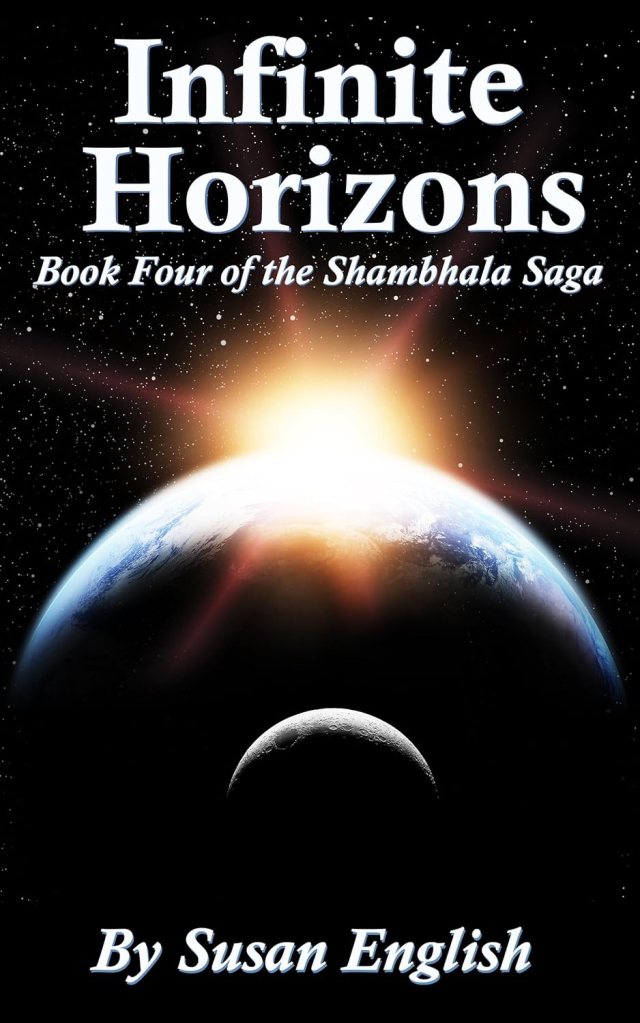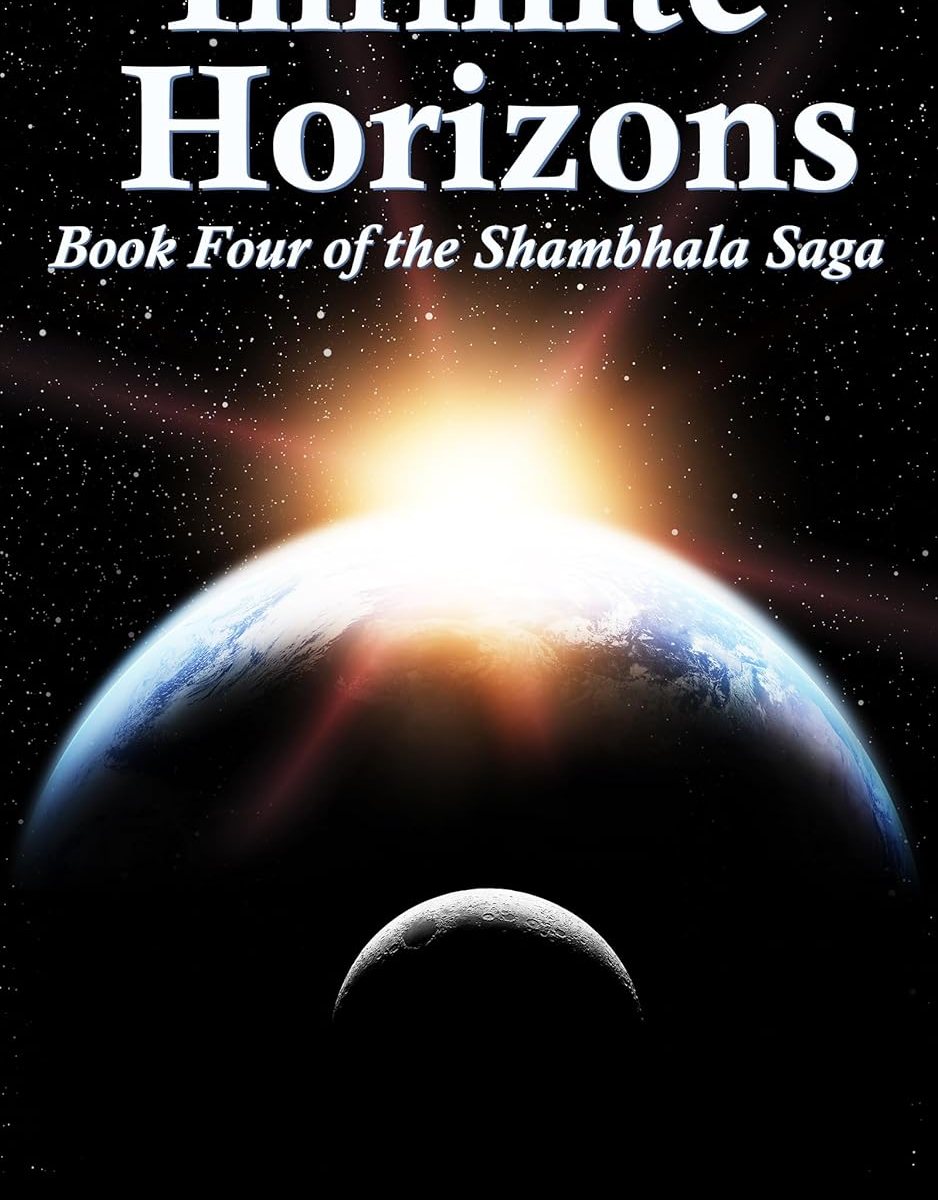
Written by Susan English
There’s a certain amount of comfort that comes with reading the fourth book in a series. You know the characters, the world, and the author’s style, and picking up the book can feel like reuniting with a dear old friend. But there are risks that come with it, like the book not living up to previous entries, or the story simply beginning to feel stale. When there’s no end in sight (from your vantage point, at least), there’s the concern that the book will simply bide its time before moving on to the next entry. Infinite Horizons is the fourth book in Susan English’s Shambhala Saga; that dear old friend. Following Callisto 2.0, Cupid’s Arrow and the poetically named The Orange Light of an Alien Sun (click the links for my thoughts about each), it’s the latest book in the series, but not its last. That it is the most enjoyable of the series thus far is an achievement for the author, and a joy for the reader.
At an estimated 313 pages on Kindle, Infinite Horizons is the shortest entry in the series (although only about five pages shorter than Cupid’s Arrow), but it puts those pages to good use. Following the conclusion of books two and three, protagonist Callisto (or Calli, as her friends and colleagues refer to her) has been reunited with Pavani. As the World Government restricts space travel, the two escape to Earth. A large portion of the book dedicated to their time spent in Tibet, the book feels as though it’s operating on a smaller scale than the others. Yet its various twists and turns up the ante, especially in relation to the rarely seen villain of the series, Hiroki Nakamura.
Like the previous books in the series, Infinite Horizons’ plot is loosely crafted, with English delighting in the smaller moments and asides. Yet, through these, the series’ bigger picture takes more shape as it lays further groundwork for the overarching narrative. While the previous three books all utilised a similar style to their plotting, Infinite Horizons feels more confident in its approach. Although it moves at a slow pace, it never feels like it, as the story moves fluidly from point A to B. The pacing is deliberate, giving the reader the opportunity to bask in the characters and world, and it has never felt truer in the Shambhala Saga as it does here.
Although most of the characters readers have gotten to know over the course of the three previous books appear in Infinite Horizons, most of their roles are reduced, often to a large degree. While these characters are all enjoyable to read, I didn’t find myself missing them. The story is populated with new characters, each of whom adds a layer of humanity to the story. These new characters are all clearly defined, engaging and fun to follow through Calli and Pavani’s adventure. Yet, upon being reunited with certain characters later in the story (particularly the AI, Annie, whose character arc continues to evolve in interesting ways), I was pleased to see them once more.
Naturally, the most prominent characters are Calli and Pavani. Calli serves as the sole point of view character and is as entertaining as ever. In seeing the world through her lens, the book provides an optimistic atmosphere, despite the threats the characters are facing. Pavani is a character that, while enjoyable, I haven’t connected with as much as Calli (despite her being the protagonist and point of view character in Cupid’s Arrow. Upon reading about her in Infinite Horizons, I’m now a convert to what a wonderful, nuanced character she is. Calli and Pavani share more scenes in this novel than any of the others (though, with the exception of Callisto 2.0, these characters have been separated), and they play off each other wonderfully. The reader can feel the chemistry between Calli and Pavani, which is a genuine delight. These characters love each other, and this love is based on mutual respect and affection for one another, rather than simple attraction. Infinite Horizons is the first book in the series that feels like a romance, and the romance is believable. It is clear through the book’s text that their love is genuine, and the reader can see exactly why each character loves the other.
If it isn’t clear from the character names (and if you haven’t read the previous reviews, which I handily linked to above), Calli and Pavani are gay. A hallmark of the series is how it presents the LGBTQI+ spectrum, and builds stories around this theme, as well as feminism, among others. The thematic resonance—which also heavily features misinformation, disinformation and fake news in this book—works wonderfully. While in previous books, they impact the story’s momentum, English has integrated them into Infinite Horizons seamlessly.
The prose and dialogue are as easy to follow as ever. The writing is clean, and it clearly articulates everything the reader needs to know. While the dialogue is written in a similar manner to the previous books, it flows more naturally in Infinite Horizons. The characters all feel like real people, and none of this comes across as stilted or awkward. Each character has their own voice, and English ensures their voices are put to good use.
As the fourth book in a series where the narrative continues from book to book, Infinite Horizons doesn’t stand on its own. If you haven’t read the first three books, you will be able to follow the fourth, but the history from those books makes this one all the more enjoyable. Although it doesn’t stand on its own, the novel still feels complete. Although it picks up part way through an ongoing narrative, any desire for more stories comes from the enjoyment of this one instead of the feeling you didn’t get a whole story.
Put simply, Infinite Horizons is the best book in an entertaining series (so far, at least). It offers the comfort of familiarity while taking the story into interesting new areas. Furthermore, it is a more assured novel, comfortable in the story it has to tell. I’m looking forward to seeing where English takes this story next.
Favourite Passage
I tried to still my racing heart, taking long, deliberate breaths, trying to match Pavani’s rhythm. We had joked that I would take two breaths to her one, because she was so much taller than I was, but it seemed as if she was making an effort to breathe at my pace, my relaxed pace. I concentrated on my respiration: in and out, in and out, and on the exhales, copying Pavani’s tender voice, perhaps in reality or maybe it was only in my head: Om Mani Padme Hum. I felt my heartbeat slowing, and with my next exhale, I repeated the mantra, barely vocalizing. The tumultuous din beyond our door faded as our chests vibrated in unison, and I felt the calm flow through my veins, gratitude filling my heart. I lost all sense of time and space in that dark room. We could have been anywhere: in the spaceport, on the Moon, or in deep space. The only moment that mattered was this one, and Pavani and I were together.
Infinite Horizons: Book Four of the Shambhala Saga, Chapter 35
Infinite Horizons: Book Four of the Shambhala Saga was provided by the author for the purpose of an honest review.
Infinite Horizons is available on Kindle, exclusive to Amazon.
Note: I do not post scores for reviews on this website, but do post them on my Amazon and Goodreads reviews:
- Amazon
- Goodreads
You can follow Susan English online, via:

Interested in purchasing Infinite Horizons: Book Four of the Shambhala Saga?
Please find a link below; please note I do not collect any proceeds from the sale.
Infinite Horizons: Book 4 of the Shambhala Saga

